#they have the themes they have the doomed by the narrative
Text
in my mind boschlow is just bromance flavored girl besties. does this make sense
#boschlowtxt#boschlow talks#like they'll spar and rough house#and then boscha will grip willow's shoulder a bit too tightly when she's pinned on the ground#and internally willow is like ''what''#and then later in the shower room shes like ''oh but it meant nothing probably. lol''#they are somehow both yaoi and yuri#they have the themes they have the doomed by the narrative#but they also do fuck all#and i think thats beautiful#i love their versatility
10 notes
·
View notes
Text


Cassius Dio, 40.27 (trans. Earnest Cary) / Canto 20, 116-17 of Purgatorio, Dante Alighieri (trans. Durling)
#ngl this is the first time ive really thought abt crassus' mention in purgatorio and i feel SO unwell about it like oh my god#and in purgatorio!!!! wow! but also this line is so invasive and violent (kind of sexy for that ngl)#esp when you consider that (we are getting away from the themes dante has established so if any of you reblog this and dunk on dante#i will banish you to the shadow realm im not joking)#lucullus is one of the two charged with crassus' narrative doom because it's lucullus' displays of wealth that tempt crassus#screaming screaming screaming. what DOES gold taste like! what flavor did it have on your tongue!#comparatives tag#marcus licinius crassus
65 notes
·
View notes
Text
people will say clem should have died at the end of s4 like we didnt get the entire barn sequence. like clem didnt literally become lee in the end seeing his fate through her own eyes. like they didnt fake us out sooooo hard. like they didnt play take us back to hammer it home. the game ended on the pan out of the ericson gates and everything after that is the epilogue where things are Fine Actually and clem gets her happy ending. we got BOTH!!
like what you wanted her fate to be the same as lees? did you miss the themes throughout s4 of breaking the cycle?? did you miss aj feeling so helpless to a fate clem sees as inevitable? where all he wants is agency? where hes looking for another way?? he tells clem she wont always be able to tell him no and he was RIGHT!! he says NO to her death!! he makes his choice and SAVES HER!! she told him they couldnt be together in death and so he said then youll have to keep living!!!
and she does!!! she loses her leg but she gains a Home. a REAL ONE!! full of people who love her. where they get to choose their own paths and make their own future Together. and she finally gets some fucking Rest. a part of herself dies in that barn but a new part gets to emerge!! she gets to live a happy life surrounded by a loving community that she helps build!!! and you think she shouldve died 😐
#aj mvp for Real#the themes bro the themes.....#aj looks clems doomed narrative dead in the eyes and says NO!!!#and i love him for it :')!!!!#s4 u understood the assignment literally the best ending i couldve asked for#like why would u want her to die 😭 whats the message there?? its BOOOORING#this girl who has been fighting for her entire life succumbs to a fate she saw as inevitable when all she wanted was some fucking Peace#Groundbreaking 🙄#her thinking its all over and its finally come down to what shes been running from. accepting her fate. but being told NO#youre gonna LIVE DAMMIT#clem having to let lee go and fight and survive on her own#aj refusing to let her go and in turn saving her life#SILLY IM SO SILLY clementine you are EVERYTHING#clem the most doomed character of all time. lives anyway. love that for her#twdg#the walking dead game#it speaks
83 notes
·
View notes
Text






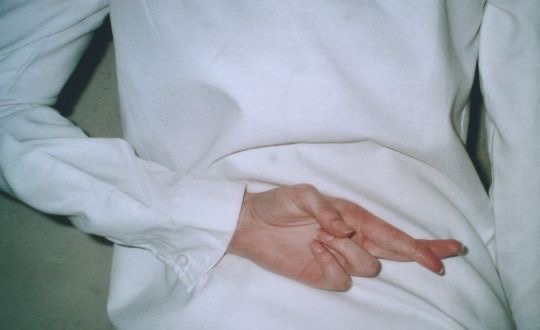
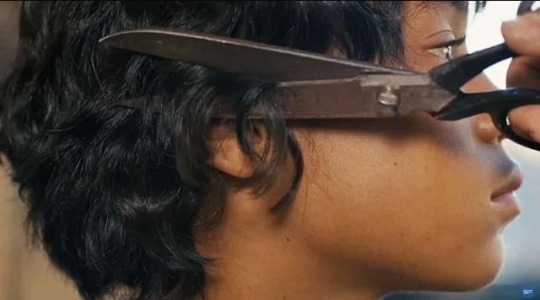


an ode to my girlhood.
#oh the plight of girlhood#i have been lonely most of my life#filled with rage#filled with love#girlcore#martyrdom#i’m a martyr#doomed by the narrative#catholic guilt#religous themes#religous imagery#girls will be girls#girlhood#2000s#childhood#quotes#girl failure#girl loser#ethel cain#aristotle and dante discover the secrets of the universe
25 notes
·
View notes
Text

How did they get into this position? Your guess is as good as mine
#valentines day!!!#I made it!!#not really valentines day themed but still#and still obsessed with these two yeah yeah that's never changing#an attempt at historical accuracy was made#I just figured out that they would have been together in the regency era which is very fun#I wanted to write smth but my brain has decided to forget how to write T_T#Also also actually movie accurate young Ebenezer black hair blue eyes and all#(Still cant believe his hair is black and not brown)#well happy valentines day ig#scrooge a christmas carol#scrooge 2022#isabenezer#my favourite doomed by the narrative
25 notes
·
View notes
Text
oh my god dude. sorry i'm gonna have a homestuck interlude to classpect qpac and his role in the narrative because i'm thinking about him
he's. SO Page of Hope coded. he's so page of hope fr. his class being a Page makes so much sense because throughout homestuck, every single Page are all people pleasers. they're walking doormats who rarely stand up for themselves. they feel like they can't do anything right, so they sit down and shut up half the time so they don't do anything wrong. and his aspect being Hope makes so much sense because like. Hope is about optimism and doing right for right's sake and helping those who are down. he holds optimism as his greatest shield even when things are crumbling around him. it's so important to him!!!!
but also being a Page means that he lacks his aspect in a way, and his journey will be long and arduous before he can see the fruits of his labour, and when his efforts pay off, MAN it will pay off. there are so many times when he has just seemed to have completely given up hope. he's been broken down again and again and again and you can see the peak of that during the risus pills arc, when he was so out of it he was actively suicidal. but somehow he keeps bouncing back!!! he found the cure anyway, he left it for Cellbit, the guy he's terrified of, and he saved himself and Forever. he will step between something that scares him and something he wants to protect even as he cries and shakes and sniffles the whole time.
the thing about Pages is that it takes a long time for them to reach their full potential, and there will be so many bumps in the road before he even comes close. but when a Page finds that potential, they can be one of the most helpful, powerful, and dangerous members of their session. Pac is an extremely useful member of the server, he's extremely skilled, he just doesn't see it, and he can't reach his full potential as a Page until he can recognize his own accomplishments. the only problem is that when Pages reach their full potential, they have a tendency of dying right away. when Jake faces Aranea in Game Over, when Tavros stands up to Vriska, they both die almost immediately.
Pac and Jake "yes and" everything because they don't want to be a burden, and Pac and Tavros don't know how to face the people who traumatized them. the inaction of Jake and Tavros is what ultimately leads to their deaths at the hands of the Light players who hurt and manipulated them. (coincidentally, i also see Cellbit as a Light player, a Prince or Bard of Light, but that's for another post!!!) Tavros didn't stand up to Vriska sooner, Jake couldn't say no to Aranea, and Pac folds as soon as Cellbit, one of his greatest fears, is in front of him with a knife.
Tavros and Jake forgive people who hurt them no matter what they've done. Pac has faced his own Light Player and died multiple times at his hands in both Purgatories, and now after a brief interrupted apology, they're supposedly just fine. Cellbit doesn't mean to be, but he is Pac's own personal Serket.
the difference with Pac though is that he is like if Jake or Tavros got a well-rounded continuation to their character arcs. his story isn't done!! it's still going!! he's getting there!!! he's getting more confident, he has support from the people around him, and i think eventually he can break this doomed-by-the-narrative cycle that fully fledged Pages seem to have.
#qsmp#mcyt classpects#sorry. i got carried away. u know how it is with classpect brainrot i'm sure <3#so sorry for putting homestuck shit in the tag bro (<<is not sorry whatsoever)#i get very carried away with classpect analysis i just think about it way too much#rotating classpects in my head all the time always#anyway. it's bedtime. buenas noches <3#edited bc i had things to add GIRL I WASN'T DONE!!!!!#of course part of the doomed by the narrative themes pages have is a result of hussie's biased writing against jake and tavros#but in a meta sense it also applies to qpac because ccpac loves making his cubito suffer <3
14 notes
·
View notes
Text
it’s been years since my last true fixation on a musical but I regret to inform you all that I just watched the 2014 Swedish Jesus Christ superstar and I feel I will never be the same again.
#i think the set design and lighting are actually what impress me most#i know this version gets hype because it’s so explicitly homoerotic#but every other little detail is so well thought out#jcs is already a very postmodern piece of art but i feel like this production really nailed it on the head#jesus is so incredibly amoral. you genuinely have no idea what he really believes#or who he loves. was it he who betrayed judas first?#and the doom of the narrative you cannot change#in the post apocalyptic setting#damn was i screaming with Judas#why would you make me the criminal!!!#and the set just reinforces all those themes#also props to the wig?? team???#that wig on Jesus gets hella bloody so they either had a shit ton of wigs#which is annoying and a lot of work to make look good#or they knew how to clean the wig each night#also Judas looks like geralt from the Witcher#and he’s hot. what can I say.
3 notes
·
View notes
Text
Ngl. I’m sort of glad I’m currently hyperfixated about Project Sekai.
Especially from what I’ve been hearing and seeing from glimpses about the jjk manga atm. I can tell the fandom discord would be chaotic!
Would the fandom be as toxic as it was during the Gojo vs Sukuna fight?
Dunno. ¯\_(ツ)_/¯
And like, it doesn’t matter to me anyway since I’m over here kicking my legs excitedly about all my favs within Project Sekai~ :3c
Besidessss. I do need that optimism in my life atm~ ;v;
#like one of the main themes within Project Sekai is to thrive to be better#both in a technical sense but mainly in an emotional and personal sense#where all the characters grow and be better and happier#and while I still hope for jjk to end on a positive note!#there’s definitely a lot of tragedy and doomed narratives within jjk#which is like! it’s good! and great! but it’s just not something I’m in a mood for atm. ya feel me?#and like Project Sekai also dives into more serious topics too!#it’s just have a more positive message and outlook is all#hyperfixations#random thoughts#my txt#project sekai#pjsk#jujutsu kaisen#jjk#txt post#fandom#jjk 261#jjk leaks
6 notes
·
View notes
Text
Don't ask:
- a man, his salary
- A woman, her age
- And a tumblrina (gn) who they voted for in the nge/moomin poll....
#Releasing this from the drafts bc the poll ends at 9pm today#It's been real y'all we go down gracefully it's been an honor fighting with y'all in the Eva trenches 🫡🫡#Also why are pitting 2 bad bitches against each other#Like do ppl realize when they say 'moomin is for queer people' the lead of Eva is also literally a depressed bi like!#He should be doing numbers here on the depressed gay site come on. Yeah it was doomed by the narrative#But what is Romance without tragedy. Like man. What a trope (only talking abt the story not the authors obv)#Imagine hearing 'maybe I was born to meet you' from a divine being who sees all your faults#And how much you hate yourself and loves you unconditionally and intensely from the moment he lays eyes on you... I'M GONNA BE UNWELL#Regardless. Times are tough but we stay silly :3 let me be silly for a moment with u it ain't serious#Wow anna said something#Anna's shitposts#Nge#Eva#I just think they're wildly different in how they approach themes and it's weird and complicated to even compare them#One is lighthearted and comforting the other feels like being crushed by a thousand elephants both are important#We got far we deserved better than to lose bc of a bit everyone was committed to but. It's respectable. It all returns to nothing or smth#Edit: the sidenote is to differentiate between the fact one is not known for being queer media but it does have that#Despite it being so small in the story (the show at least but it's significant) and the other#Is obv queer media bc of the author and it's not in the story as far as ik but it's an accepting/inclusive story#Why do u think it got so big and a character that appeared once became one of the biggest*. It obv meant smth to ppl#*to the point he appeared more in the rebuilds and is all over in merch. ANYWAY SORRY FOR RANTING IN THE TAGS I GOT PASSIONATE OK
5 notes
·
View notes
Text
She helped you no matter how awfully you treated her, she was always there for you, and when you thought everything was over and you could get better she was taken from you. No matter what you do you could not save her. There is no end where she does not die. In a twisted irony you couldn’t protect her. Is the blood on your hands hers or is it your own?
#doomed by the narrative#lucid9#lucid9 inciting incident#rui hayata#Yama ishimoto#rui x Yama#Yama x rui#anyway having feelings abt a vn I played years ago#tw dark themes
3 notes
·
View notes
Text
we're a few months out so I can share my personal hottest BG3 takes
Orpheus shouldn't have turned into an illithid. If you didn't make a deal with the Emperor, then you should have had to sacrifice yourself or one of your companions to succumb to ceremorphosis instead of the NPC that we've known for about 5 seconds and who introduced himself by telling us we should've let ourselves die.
There shouldn't be an in-game Durgetash romance option / past Durgetash should never be made explicit canon (because so much of the fun of that relationship is just playing around in the empty spaces available to us. Also. Lesbian Durge rights.)
If there IS ever a Durgetash romance option put in game, it should immediately ruin your current romance and piss off everyone. Sleeping with Mizora but worse. No One Liked That.
Even if you romance him, the big dick oil baron still dies.
#HE .DOES NOT. GET. TO LIVE.#i adore the man he's so much fun but oh my god#ignoring my personal feeling that he's more interesting as a doomed villain#LETTING HIM LIVE FUCKS UP THE REST OF THE NARRATIVE#'but my romance :(' no! this is a story! we have themes to explore!#and one of those themes is the unspeakable corruptive murderous influence of power hunger and the pursuit for authority#this man is not seeing the withers party#//#bg3#bg3 spoilers#i guess? man#it's been a while
1 note
·
View note
Text
i honestly kinda hate having really specific special interests. like in the realm of trains, there's a lot of interconnecting minutiae to get enraptured by, so it's easy to coexist with people who are into the more common interests like train models even if it does nothing for you.
my longest lasting special interest is rhythm game menus/UIs. i could elaborate on what that means, but i'm convinced that it'd make zero sense even to people who know what i'm talking about. i'm into rhythm games in the more conventional way, too, but i also have dark, perverse thoughts like "what if [song] was in [game]" (as in visually how it would look among the collection of songs in said game along with that particular game's UI) or "what if [game] had [online service that said game predates]" (as in how the sound and graphic design of said game would influence the design of the menus that would exist as a result of the implementation of said online service) or "what if i replaced all the audio in DDR SuperNOVA* with Danganronpa sounds" (untranslatable).
my mind is the Lost Springs of people
#ipj speaks#i feel like im forever damned to find myself in the most barren niches-of-niches regardless of what niche i enter#is this that doomed by the narrative thing the kids have been talking about#*the supernova theme in stepmania not any of the official releases of the game. i am that willing but not that ambitious
1 note
·
View note
Text
Released in 2010, Obsidian Entertainment's Fallout: New Vegas actively concerns itself with the realities of gay existence, and is widely recognized as a noteworthy work of queer science fiction. New Vegas extensively examines social attitudes towards homosexuality among the game's major factions, and primarily conveys this lore through gay and bisexual characters describing their own experiences. It also allowed the player to mechanically set the Courier's sexual orientation. By taking both available perks, the player character can be bisexual. By choosing neither, the player can opt out of seeing flirtatious dialogue options.
Uniquely, Fallout: New Vegas explores homosexuality in the context of wasteland societies, and touches upon related issues. The core theme of New Vegas is that the desire to recreate the past is driven by irrational nostalgia, and any endeavor to manifest past glory is dangerous and doomed. The social issue of homophobia is used as a demonstrative example. The resurrection of corporate and military power structures presents new avenues for Old World problems such as institutional homophobia to reemerge. One of the many issues that divide the New California Republic and Caesar's Legion is the latter's open persecution of gay people. The NCR is described as tolerant and even accepting of same-sex relationships, though acceptance tends to fall off the further one moves away from the developed, urbanized core of New California.
In recent years, the Republic's rapid economic transformation has led to an unforeseen erosion of the humanitarian ideals which it was founded to serve. In practice, to recreate America was to take on its shortcomings and its sins. As subsistence scavenging has dried up, the people of the NCR increasingly turn to wage labor, entrepreneurial venture, or military enlistment to keep their families fed. Meanwhile, their government enacts morally corrosive imperialism (narrative verbiage), their dominion expanding indefinitely as their infrastructure crumbles from within. This has led to a profit-based imperial monoculture which must conquer, consume, and coerce to perpetuate. As personal politics and service labor grow in importance, people find themselves more inclined to present as "normal" in the interest of financial stability and political expedience. A loading screen visualizes this culture of artificial social normalcy: the portrait of President Aradesh on the NCR 5$ bill neglects to depict his unibrow, earring, and facial scarification, overall portraying the once-chieftain so cleanly-cut as to be unrecognizable at first glance. He also appears to be wearing a collared shirt or suit as opposed to the robe he wore in Fallout.
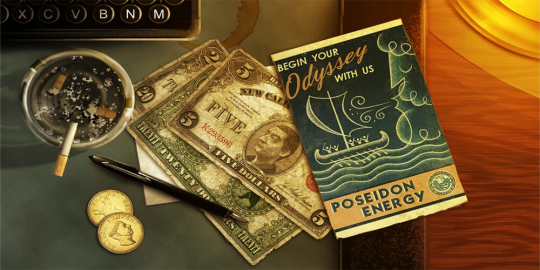
In the Legion, Caesar has mandated that every legionnaire take a wife and produce children, citing high infant mortality rates and the constant need for soldiers, and going as far as instituting child quotas. He treats human beings as a resource to be exploited for war. Ostensibly in this aim homosexuality has been declared a capital offense punishable by death. Historically, routine demonstrations of violence towards women and gay people are a deliberate feature of fascist societies, the only logical cultural conclusion of a government devoted entirely to war and control.
In Forlorn Hope letter 9, an NCR soldier wrote wrote the following to his boyfriend:
Dearest Andrew,
Writing this seems pretty morbid, but tomorrow we march into the no man's land between our camp and Nelson, which is crawling with Legion. The Major insisted I write this damn "if you get this, I'm dead" letter so here it is. What a crock. I have the luck of the devil and your love on my side, so I'll be home soon. Keep the porch light on for me.
We'll party in New Vegas when I get back.
I love you.
—Devin
Devin believed he would prevail over the Legion because his love would keep him safe. He was found dying or dead on the battlefield, the letter was found on his body. In a post-release patch, the injured soldiers were removed from the battlefield for performance reasons, and never re-implemented.
Driven largely in reaction to the Legion's hyper-masculine posturing and misogyny, rumors persist across the Mojave that gay male relationships are not only common within the Legion, but condoned. These rumors are repeated commonly in NCR society. A closeted NCR Major mentions that the Legion is "a little more... forgiving" about close male "friendships," speaking in a hushed tone to avoid suspicion. At the same outpost, the player can encounter Cass, a bisexual civilian woman. She may flirt with a male Courier, who may imply they are gay, prompting her to imply gay men are more common in the Legion. Even as gay men fight and die in the name of love under his command, NCR General Oliver may remark to Courier Six at the Second Battle of Hoover Dam: "If you think after all that's happened, I'm going to grab my ankles and take it like the Legion..."
This writing pertains to institutionalized homophobia which manifests in practice though power structures and social interactions without being written into law. Simply put, in his derogatory remark, the general expresses to his army that military surrender is gay, much like their gay enemy. From the brevity and bluntness of this remark, it's clear that this sentiment is already well understood among his ranks. Logically, to project strength in the eyes of such a leader, one might also project homophobia by scrutinizing and harassing one's peers and subordinates. In this atmosphere, the expression of homophobia is not only normalized, but materially incentivized. For the ambitious, it becomes a tool, and a way of casting shame upon rivals. For the closeted, homophobia becomes a survival tactic, hoping to throw scrutiny off oneself. This is why Major Knight is immediately frightened when a male Courier flirts with him. He is so profoundly alienated that he romanticizes life as a gay man under the Legion. The Legion punish homosexuality with death, and yet Knight characterizes them as more "forgiving" than the NCR. Through these apparently disparate events, the audience can trace how a distorted perception of gay people emerges among insecure men in a military environment, and subsequently becomes ingrained in the corresponding civilian culture.
At the 188 Trading Post, a lesbian from the Brotherhood of Steel named Veronica also wryly remarks that she believes legionaries have gay sex about as often as straight sex. She also notes that this only applies to men, as women have no rights whatsoever in Legion society. In this aside, she conveys a pre-existing frustration with lesbophobic social norms. Veronica also mentions that the people of her bunker would rather she remain on the surface.
The Mojave Brotherhood of Steel has no official policy prohibiting homosexuality, but an implicit attitude among its dominant members that their limited numbers require everyone to have children to avoid extinction. Numerically, this may seem logical on the surface, given their reluctance to recruit outsiders. However, given their tiny population, this is an ineffective countermeasure, as they do not have nearly enough members to maintain genetic diversity for more than a few generations. This approach is not universally supported by all family units within the Brotherhood, but every individual is ultimately at the mercy of the elder. Veronica was in a lesbian relationship, but they were quietly separated by Elder Elijah, due to the dominant culture of enforcing heterosexual pairing among their population.
Caesar's law has not ended homosexuality within his domain. Despite the obvious risks, some legionaries have continued to pursue relationships behind closed doors, especially given their access to slaves. So long as members complete their societal obligations and fulfill the child quotas, they are able to pursue romance with other men in secret. Homosexual relationships in the faction are noted as being relatively equal compared to the average Legion husband and wife, in a "Don't Ask, Don't Tell" sort of open secret policy. Gay legionaries must always make sure to keep their activities hidden.
A centurion was once almost caught fraternizing with the teenage boy he had chosen to tend his tent. Despite previous "romantic" intentions, he quickly resolved to dispose of the slave to dispel suspicion. Had they been caught together, the centurion would have been charged with homosexuality and sentenced to death. This story is only known because the enslaved young man, Jimmy, managed to escape execution. Further illustrating the cruelty intrinsic to Legion governance, it's stated that homosexuality was the crime, and not the rape of a young slave; in fact, it seems Jimmy was forced to contribute to the child quota despite being a gay teenager, and the experience left him traumatized. He has resolved to never have sex with another woman, as the very notion triggers memories which fill him with disgust, and (in his own words) makes him feel like a slave all over again.
The Strip is indifferent to gay people, viewing them as another opportunity to make caps. Both the Gomorrah and the Atomic Wrangler are interested in maximizing profits, and their prostitution services cater to clients regardless of their orientation. The openly gay Jimmy works at nearby Casa Madrid, but there is some tension among his peers due to his co-worker Maude's blatant homophobia. She supposes he's "okay, for one of those," and if propositioned by a female Courier, Maude will direct them to Sweetie for such "perverted" services. Pretty Sarah must regularly intervene to keep the peace among her staff.
The Followers of the Apocalypse, well-read punks who seek to embody healing through anarchistic values, are not concerned with gender. Most are openly and casually sexually active. Upon meeting Courier Six, Arcade Gannon offhandedly makes his gayness known, unprompted. The audience must face the fact that Arcade's apprehension of the Legion is far from abstract; under Legion law, he would be put to death. One possible ending gives further insight into Caesar's hypocrisy: should the player sell Arcade into slavery and leave Caesar alive, he will keep Arcade as a personal physician and philosophical advisor. They intellectually spar at length, and Caesar grows singularly fond of him. Accordingly, Arcade imitates the historic suicide of Cato the Younger by disemboweling himself. The Legion's remaining medics attempted to save his life, but none were Arcade's equal. Caesar understood his doctor's final gesture of contempt, and mourned him for months.
New Vegas ventures further into themes of healing from the trauma of sexual violence, from the perspective of a lesbian character. Corporal Betsy, an NCR sharpshooter, is a rape survivor, and suffers with PTSD from the incident. Her unprocessed trauma has manifested as a maladaptive tendency to aggressively and explicitly proposition the women she encounters, in an effort to reassert a sense of control. This defensive hypersexual impulse has negatively impacted her ability to connect with other women. A male superior officer notes that her behavior is inappropriate for anyone of her stature, but abstains from disciplining her out of sincere concern for her mental health. The Courier can help her begin to recognize these problems, and convince her to seek treatment from Doctor Usanagi at the New Vegas medical clinic, which proves helpful to her as she processes and heals from her trauma.
In Old World Blues, the Think Tank are five floating brains in jars who express themselves by waving robotic arms bearing screens depicting facial features. Before the War, they were federal scientists who committed crimes against humanity in the name of weapons development. Each is stuck in some sort of neuro-bionic feedback loop which prevents them from moving forward with their projects, mentally binding them to their central laboratory. Walking through their homes at Higgs Village, it's clear each was deeply neurotic before they were transformed into floating brains.
Now without bodies, they attempt to maintain the illusion that they are exempt from sexuality as purely mental beings, but each displays obvious interest in the human form. They have codified this shaming with the term "formography." Most of the men are obsessively defensive over their complete disinterest in penises, which they talk about constantly. However, the shameless Dr. Dala shows overwhelming interest in observing and recording any and all human functions. Already androgynous in her pre-War life, Dala has taken to self-identifying as a "gender neutral entity" (though she is not known to use they/them pronouns). Regardless of the Courier's gender, they may coquettishly scratch themselves, clear their throat, and stretch in front of Dala until her biomed gel decoagulates. Dr. 8 also responds positively to graphic masturbation advice from Couriers of either gender.
The X-8 research facility is ostensibly a massive immersive shrine to Doctor Borous's hatred of Richie "Ball-Lover" Marcus, a long-dead child who bullied Borous centuries ago. He also clings to his resentment of one Betsy Bright, who refused to attend a dance with him, supposedly so she could "go smoke with RICHIE MARCUS." Clearly arrested in development, Borous has literally built a temple to the fantasy of torturing his adolescent romantic rival and feeding him to dogs. His frozen, static characterization of the jock Richie Marcus as a "pinko-commie" who "likes balls" reflects the shallowness, pettiness, and overall misanthropy underlying his patriotic identity.
It remains apparent throughout Old World Blues that the Think Tank are all chronically sexually repressed, which is inseparable from the values of the violent and judgmental pre-War culture which created them. With time and isolation, this ingrained repression has manifested as various intense and deranged psychosexual behaviors, including rage-fueled homophobia, voyeurism, and the obsessive performance of puritanical pretense.
____
“Although I’ve been out for a very long time, I made a conscious effort to be out with relation to this project, as I wanted to be visible as a lesbian in the game industry. New Vegas itself is, I think, one of (if not the) best games out there in how we treat homosexuality – and all of that is very intentional.”
“If my work on FNV, if my being out has helped even one gay person, then I have succeeded.”
— Tess “Obsidian’s Gay Cowgirl” Treadwell
____
written (with help from other editors) for fallout.fandom.com/wiki/LGBT_representation_in_the_Fallout_series
criticism welcome
2K notes
·
View notes
Text
An overwhelming theme of Greek mythology seems to be that things used to be better and everything sucks now. Which makes sense when you realize that the Mycenaean Greeks stopped doing big society for whatever reason and their great big palaces were left to crumble and the Greeks of the dark age didn’t know exactly why those were there but they did know that they used to be full of people.
And when they lost their trade routes, they lost their access to tin and couldn’t make bronze anymore and had to use iron instead.
Hesiod coined the term Iron Age. He claimed truly he was living in an age of iron but he meant this as a bad thing. Bronze is prettier than iron. We now know that iron is harder and better in many ways but they didn’t know that. Bronze was just better in their minds.
But by the time the Greeks had started writing down their opinions about all of this, life had started to return to a similar level of impressiveness to the way it used to be. Great big walked city states were created. Culture and trade in the Mediterranean began to be awesome again.
But still in the mythos and the literature was that feeling hanging over everything that the current day and age sucks in comparison to the far past. So when almost every Greek myth ends in tragedy you have to wonder if this was just the natural order of things to them. Things get worse.
In reality things don’t universally get worse, not do they inherently get better with every generation.
And is this an age of iron? And if it is, what does that mean exactly? Are we all doomed by the narrative or not?
4K notes
·
View notes
Text
a lot of people have already pointed out how totk has a lot of themes of imperialism and generally leans conservative ideologically, but what i think is interesting is how totk subtly redefines what a “researcher” is.
zelda wants to be a researcher in botw, and what this means in the context of botw is largely someone who works with sheikah technology. she wants to figure out ancient sheikah tech, she has an interest in botany and otherwise nature and biology (the whole silent princess and the frog thing), robbie and purah, the two characters who are the closest to us seeing what a researcher in the context of botw is are basically inventors. in totk, however, the main researchers who are presented to us are all historians.
this is an interesting pivot, because in botw zelda is not really interested in history. if anything, the one who’s deeply concerned with history is rhoam, wanting to preserve historical tradition and his uncritical reliance on said tradition and historical precedent is what leads them to their doom. in botw, zelda is narratively opposed to history, if anything, all the ancient tech backfires on them and traditions fail to awaken zelda’s power. zelda’s urge to be a researcher is in wanting to understand the world around her, not just blindly follow ancient plans but rather have agency within them.
totk, however, is obsessed with ancient plans. the only real moment where zelda gets to geek out in totk is her getting all giddy about finding out more about the divine origins of hyrule. all the researchers in the game are concerned with finding out more about the zonai. since all the mentions of ancient sheikah technology are scrubbed from the game purah and robbie read more as strange outliers, the sheikah slate is no longer, now it’s the purah pad, a product of purah rather than something larger. the whole game is literally about following an ancient plan, a plan most characters don’t fully understand as they sign up for it. totk’s main story is built on confusion, on the characters not knowing what’s fully going on but having faith in ancient sages telling them what to do. in botw, following ancient plans you don’t fully understand was the thing that doomed you. in totk, following ancient plans you don’t fully understand is the gimmick.
that juxtaposition between the two games has an ideological through line: botw posits that progress is necessary. mindlessly relying on tradition doesn’t work. prophecies are omens, not instructions. history must be learnt from, not repeated. the ancient sheikah aren’t a group to be emulated, but rather to be learnt from, considering their machinery backfired and the royal family betrayed them. totk, however, is obsessed with the mythical history of hyrule, a time where everything was idyllic until one bad man showed up, a time we must emulate in order to win. i already talked about how the past in totk is zelda’s life pre calamity but better here, but that also plays into the idolisation of that era and its royalty. in botw, even the myth of the first calamity preserves the fact that the yiga clan has origins in the royal’s family persecution of the sheikah, even the time when they successfully held back the calamity is tinged with mistakes that still affect the world ten thousand years later. in totk, ganondorf’s origins are nebulous. nobody provoked him, nobody did anything wrong, he’s just evil because he is.
a lot of right wing ideologies are hinged on preservation, but more than that: the belief in the nebulous mythical past in which everything was better. “make america great again”, the fascist’s idolisation of ancient rome which is represented largely inaccurately, look at any conservative rhetoric and you’ll see people complaining about how things nowadays are ruined or are being ruined, how in the past things were this way and they’re not anymore, which is bad. the belief in the fact that in some past period we were great and are not anymore, and the strive to emulate that past is a trait highly typical of right wing ideologies. and in totk the past as a great era is an idea presented completely uncritically, the narrative is entirely controlled by the game and doesn’t dwell on any of the inconsistencies in this idea.
now, obviously, not every story in which a great ancient era exists is fascist, right wing or conservative. but to me what’s interesting specifically in totk is this shift between the two games: botw is critical of the past. it’s critical of arrogantly repeating history, it’s critical of having blind faith in great relics of the past. totk isn’t. totk idolizes the past, totk tells legends and tells you to believe them without any doubts. botw believes researchers are those who seek to understand the world, innovate it and solve problems without relying on ancient ways. totk believes researchers are those who discover ancient instructions, ancient ways and relay them to great men in the present to be followed. the four mainline regional quests in botw are about discovering four ancient relics that are terrorising the land and fixing the mistakes of the past. the four mainline regional quests in totk are about discovering four ancient legends are true, and receiving instructions from an ancient sage on what to do.
totk is not simply neutral, it is ideologically conservative in stark contrast to botw, because of the things it chooses to leave uncriticised, notably the things botw was very poignant about examining critically. the way totk redefines what is a researcher is indicative of this, indicative of the way it chooses to idolize or present as an unexamined good that which was nuanced in botw. totk isn’t just conservative in the sense that it presents uncritically a “good king” and “evil conquerer”, it goes deeper, it’s notable because botw was starkly opposed to the thematic axioms totk presents.
i just think it’s very interesting that they made a sequel to botw, and completely redefined or otherwise ignored botw’s thematic core.
#totk critical#loz#botw#totk#legend of zelda#tears of the kingdom#breath of the wild#meta#analysis#my hot takes
2K notes
·
View notes
Text
Quick Slash is even cooler from a narrative perspective, and why I think the Nailsmith's story parallels the Pale King's
Cold take: Quick Slash is the best charm in Hollow Knight.
Slightly Warmer take: Quick Slash is the only S-tier charm that is great from both gameplay and lore perspective (aside from maybe Spell Twister).
The reason for this is that its existence is actually a
metaphor
Here, look at this.
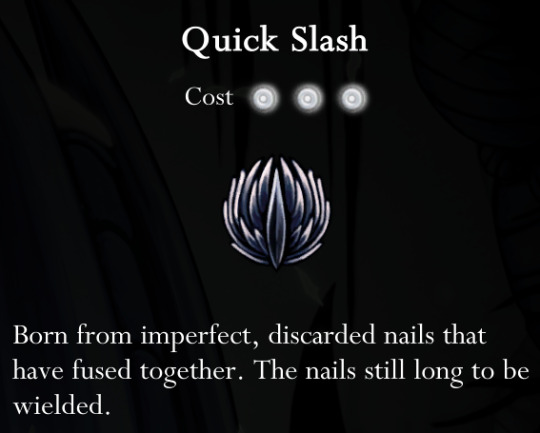
So, Quick Slash is something that was created from a relatively big number of objects that were discarded and deemed imperfect, and that possess a collective will of wanting to fulfill their purpose.
You know what that reminds me of?
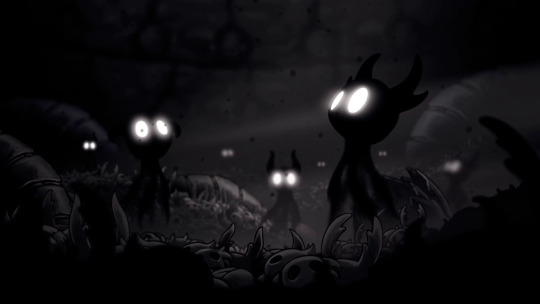
A large amount of creations: check.
Discarded as imperfect: check.
Still possessing a will to find closure: check.
Being a part of a larger, more powerful thing: check.
Having a common creator who is responsible for their creation and rejection: check.
So yeah, I think that Quick Slash's lore (or at least its description) is meant to parallel that of the Vessels'.
But I wanna talk about that last point: the creator.
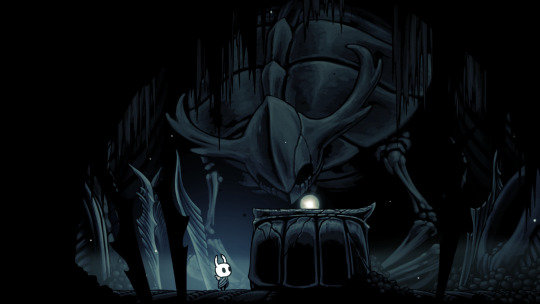
It is heavily implied that the person who created and then later discarded those nails was the Ancient Nailsmith we see in the room where we get Quick Slash.
(Oh by the way I just realized that this stone ring thing on the right of that room is actually the furnace, neat.)
Judging from their Dreamnail dialogue, this Ancient Nailsmith was trying to achieve the same goal as the other, more famous Nailsmith we all know and love: creating a Pure Nail.
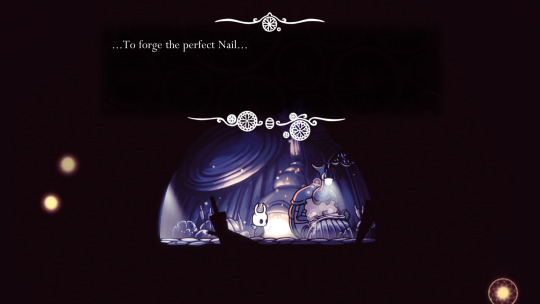

And you know who else was trying to create a perfect, Pure thing while discarding many other similar things that later gained a collective will?

That's right - it's the guy who is also responsible for creating those other discarded things we discussed earlier!
Ok, but what I really wanted to talk about here is how all of what I just said ties back to that other, more famous guy - The Nailsmith.

We don't know for sure how the story of the Ancient Nailsmith ended, but it feels like it exists there mainly to put an emphasis on the City's Nailsmith's story; to convey that his struggle is an important theme in this narrative (because ancient means important, ok?) And, I mean, the City's Nailsmith's story also parallels that of the Pale King's in the same manner, right?
The thing is, we already know how PK's story ended.

In trying to achieve perfection, to create an eternal Kingdom by making a Pure Vessel devoid of mind, voice and will, the Pale King doomed himself to be taken over by his regrets, by the vast emptiness of the futility of his struggles. But was it because he failed, or because that was where his story was headed all along?
What if PK succeeded? What if the Radiance was sealed forever? What if his Kingdom actually stood eternal, never to change, never to end? What if he realized he achieved his only goal in life?
And that's the part where we get to a story the ending of which is up to the player's choice.
To quote White Lady, only two obvious outcomes there are from such a thing.
The first is an honorable death by the fruits of his labor.
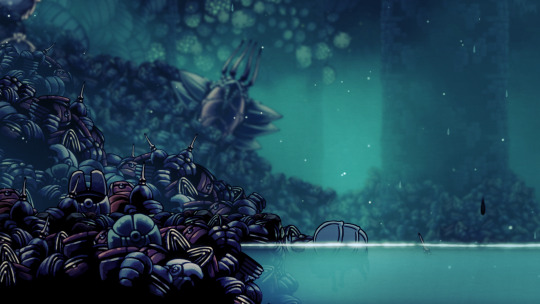
If we choose to kill the Nailsmith with the Pure Nail, he dies happy, knowing that his life's goal is accomplished and having gained all the satisfaction he could from it.
The second I find preferable, a new passion.

If the Nailsmith doesn't feel the finishing blow of the Pure Nail, he is left unsatisfied. But, while trying to resolve that unsatisfaction, he eventually finds something (and someone) that gives him a new calling, a new thing to create, a new reason to live.
And, while those are both equally valuable, equally canonic outcomes, don't you think the second one is just... better? I mean, not only does it include the achievement of the Nailsmith's goal, but it lets him live AND gives two lonely souls a partner in life! I feel like that's the thing this narrative is trying to convey. What it's trying to say about the meaning of life, about our dreams.
Maybe that was the ultimate folly of the Pale King - the inability to change. His story would've ended in the same way, regardless of whether Hallownest lasted eternally or not. He would be dead, if not by the hands of the Void, but by his own - but ultimately, by the hands of that vast emptiness of realizing that you achieved your only goal and that now all there is for you is this eternal satisfaction that slowly fades away, leaving you with nothing.
TL;DR: Quick Slash is the best because it's a metaphor for discarded vessels; perfection is overrated, try to get laid instead.
#hollow knight#hollow knight lore#hollow knight theory#nailsmith#pale king#hollow knight charms#quick slash#hallownest#pure vessel#hk vessels#sheo
618 notes
·
View notes